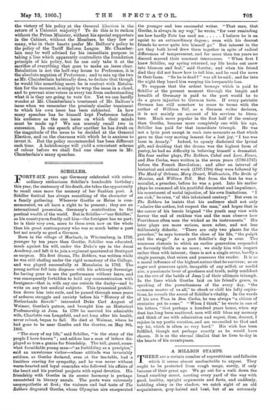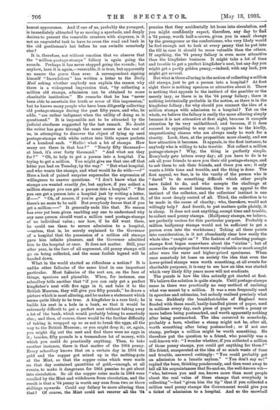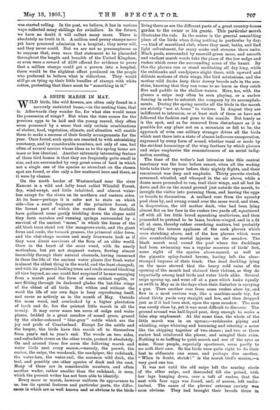A MILLION STAMPS.
THERE are a certain number of superstitions and fallacies which it seems almost uncharitable to expose. They ought to be protected from rough usage, surely, if only because of their great age. We go out for a walk down the broad sunshiny street, meeting every yard of the way with good, healthy, upright arguments and facts, and suddenly, hobbling along in the shadow, we catch sight of an old acquaintance, grey-haired and bent, but of an extremely
honest appearance. And if one of us, probably the youngest, is immediately attracted by so moving a spectacle, and deeply desires to present the venerable creature with sixpence, is it not an ungrateful task to have to cross the road and bash in the old gentleman's bat before he can swindle somebody else ?
It is, therefore, not without emotion that we observe that the " million-postage-stamps " fallacy is again going the rounds. Perhaps it has never stopped going the rounds ; but anyhow, here it is again,—venerable, it is true, but apparently no nearer the grave than ever. A correspondent signing himself " Incredulous " has written a letter to the Daily Mai/ asking whether anybody can explain the reason why there is a widespread impression that, "by collecting a million old stamps, admission can be obtained to some charitable institution." He remarks that he has "never been able to ascertain the truth or error of this impression," but he knows many people who have been diligently collecting old postage-stamps during the past fifty years, and who, he adds, "are rather indignant when the utility of doing so is questioned." It is impossible not to be attracted by the judicial aloofness suggested by the last remark. No doubt the writer has gone through the same scenes as the rest of us, in attempting to discover the object of tying up used postage-stamps with white cotton into little square packets of a hundred each. " Hullo ! what a lot of stamps. How many are there in that box ? " "Nearly fifty thousand— at least, it's over forty thousand." "And what are they for ?" "Oh, to help to get a person into a hospital. I'm trying to get a million. You might give me that one off that letter you had on Tuesday, by the way." "But what hospital, and who wants the stamps, and what would he do with—?" Here a look of pained surprise supersedes the expression of willingness to answer questions. "I don't know what the stamps are wanted exactly for, but anyhow, if you collect a million stamps you can get a person into a hospital." "But you can get a person into a hospital just by writing a letter, if—" "Oh, of course, if you're going to argue about it, there's no more to be said. But everybody knows that if you get a million—" It generally ends like that. No reason has ever yet been given enabling any one to understand why any sane person should want a million used postage-stamps of no individual value ; nor how, if he did want them, he could use them to secure admission to a hospital, —unless, that is, he merely explained to the Governor of a hospital that the possession of a million old stamps gave him infinite pleasure, and the Governor admitted him to the hospital at once. It does not matter. Still, year after year, in the face of all argument, old penny stamps will go on being collected, and the same foolish legend will be handed down.
What in the world started so ridiculous a notion? It is unlike other fallacies of the same kind in one important particular. Most fallacies of the sort are, on the face of things, specious and plausible. When, for instance, one schoolboy tells another that "if you can only get a perfect kingfisher's nest with five eggs in it, and take it to the British Museum, they will give you fifty pounds," be draws a picture which is most alluring, and be makes a statement which seems quite likely to be true. A kingfisher is a rare bird ; be builds his nest in a hole in a bank, so that it would be extremely difficult to get a perfect nest without taking away a lot of the bank, which would probably belong to somebody else ; and then, of course, there would be the further difficulty of taking it, wrapped up so as not to break the eggs, all the way to the British Museum ; or you might drop it; or, again, you might dig out the nest and find there were no eggs in
it ; besides, fifty pounds is a tremendous lot of money, with which you could do practically anything. Then, to take
another instance, there is that matter of the 1864 penny.
Every schoolboy knows that on a certain day in 1864 the gold and the copper got mixed up in the melting-pots at the Mint, so that the copper coins which were made on that day contained quantities of gold,—enough, at all events, to make it dangerous for 1864 pennies to get about into circulation. So all the copper coins made in 1864 were recalled by the Mint and withdrawn from circulation, and the result is that a '64 penny is worth any sum from two or. three
shillings upwards. Could any fallacy be more alluring than that? Of course, the Mint could not recover all the '64 pennies that they accidentally let loose into circulation, and you might confidently expect, therefore, any day to find a '64 penny, worth hall-a-crown, given you in small change by the greengroeer or the confectioner, who very likely would be fool enough not to look at every penny that he put into the till in case it should be more valuable than the others. If anything, the '64 penny fallacy is even more attractive than the kingfisher business. It might take a lot of time and trouble to get a perfect kingfisher's nest, but any day you might get a partly golden penny,—indeed, with any luck, you might get several.
But what is there alluring in the notion of collecting a million old stamps, just to get a person into a hospital ? At first sight there is nothing specious or attractive about it. There is nothing that appeals to the instinct of the gambler or the merely lazy, as there is in the '64 penny fallacy; there is nothing intrinsically probable in the notion, as there is in the kingfisher fallacy ; for why should you connect the idea of a million stamps with admission to a hospital ? Yet on the whole, we believe the fallacy is really the more alluring simply because it is not attractive at first sight, because it compels attention by its very unlikelihood, and because, if it does succeed in appealing to any one, it appeals to the kindly, unquestioning classes who are always ready to work for a charity. Look, then, at the proposition more closely, and see how attractive it becomes. It appeals, in the first instance, to anybody who is willing to take trouble. Not collect a million postage-stamps P Why, the thing is perfectly simple. Everybody gets letters every day ; all you have to do is to ask all your friends to save you their old postage-stamps, and to ask them to ask their friends, and there you are ; it only wants a little time and trouble, and the thing is done. The first appeal, we fear, is to the vanity of the person who is " dared " to do something difficult which other people have failed to do, and who accepts the challenge at once. In the second instance, there is an appeal to the instinct of the collector, and the collectors' instinct is one of the most deeply rooted of all. Third, the collection is to be made in the cause of charity ; who, therefore, would not willingly help ? And fourth, to put matters quite plainly, it is cheap. It does not cost anything, except time and trouble, to collect used penny stamps. (Halfpenny stamps, we believe, are perfectly useless for this particular purpose. Probably a million halfpenny stamps would not be sufficient to get a person even into the workhouse.) Taking all these points into consideration, is it not abundantly clear how easily the whole idea "caught on" ? The fashion of collecting postage- stamps first began somewhere about the " sixties " ; but of course the only stamps that were really valuable or much sought after were the rarer and higher-priced specimens. When once somebody let loose on society the idea that even the lower-priced stamps were worth something, at all events for charitable purposes, it is easy to see how an idea was started which very likely fifty years more will not eradicate.
The puzzle is how the idea actually got started at first. We believe the solution is quite simple. Until postage-stamps came in there was practically no easy method of realising what was meant by a million. It was a sum frequently used in speeches and estimates, but nobody realised precisely what it was. Suddenly the breakfast-tables of England were flooded with these small, 'easily-handled pieces of paper, used in millions every day, each piece of paper worth a penny or more before being postmarked, and worth apparently nothing after being postmarked. The idea occurred to somebody, probably a bore, whether a stamp might not be, after all, worth something after being postmarked ; or if not one stamp, perhaps a million might be worth something. He therefore put the question to a friend, who possibly was a well-known wit: "I wonder whether, if you collected a million of those penny stamps, you could get anything for them ?" His friend, exasperated at the idea of so much waste of time and trouble, answered cuttingly: "You could probably get an admission to a lunatic asylum." "You don't say so!" replied the bore, thinking ponderously, and then went away to tell all his acquaintances that So-and-so, the well-known wit— "who, between you and me, knows more than most people about the real value of these stamps that everybody is collecting "—had "given him the tip" that if you collected a million used penny stamps the Government would give you a ticket of admission to a hospital. And so the snowball
was started rolling. In the past, we believe, it has in various ways collected many shillings for swindlers. In the future, we have no doubt it will collect many more. There is absolutely no truth in it. A million used penny stamps never yet have procured admission to a hospital; they never will, and they never could. But we are not so presumptuous as to suppose that, even were that statement to be placarded throughout the length and breadth of the United Kingdom, or even were a reward of £100 offered for evidence to prove that a million stamps could get a person into a hospital, there would be the slightest effect produced on the people who preferred to believe what is ridiculous. They would still go on tying up their little bundles of stamps with white cotton, protesting that there must be "something in it."








































 Previous page
Previous page